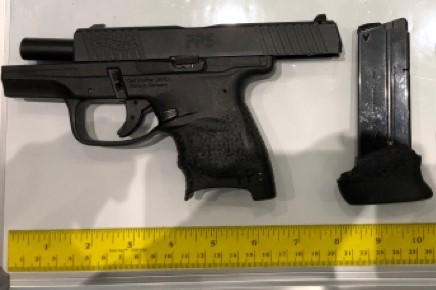
Passengers: remember to unpack before you repack for a flight!
Many travelers have driven instead of flying to locations in recent months and they may have their gun or other prohibited items in their suitcase, purse, backpack or computer bag. Now is the time to be sure that is not the case.
Passengers continue to bring firearms, knives, brass knuckles and other items that will result in a bag search and possible arrest by our law enforcement partners. Sixty guns were brought to checkpoints across the state in the last 30 days, bringing the statewide total for the year to 360 guns. Thousands of pounds of prohibited items have been intercepted by the Transportation Security Administration (TSA) as well.
On Wednesday one passenger at Sarasota-Bradenton International Airport came to the checkpoint with two guns in his carry-on. Eight guns were stopped this month at TSA checkpoints at each Tampa International, Orlando International and Ft. Lauderdale Hollywood International airports.
Year-to-date, here are the totals for some of the airports in the state: 43 guns have been stopped at Miami International Airport (MIA); 62 at Ft. Lauderdale-Hollywood International Airport (FLL); 65 at Orlando International Airport (MCO); 57 at Tampa International; and 30 at Jacksonville International Airport.
“With the TSA’s Stay Healthy, Stay Secure campaign, a nearly touch-free checkpoint experience is possible if you know exactly what is inside your carry-on and you leave the prohibited items at home,” said TSA Spokesperson Sari Koshetz.
Passengers bringing a firearm to a TSA federal security checkpoint will be assessed a civil penalty up to $13,669 and this civil penalty is independent of whether you are arrested or face criminal charges from our law enforcement partners. Fines may also be assessed for other prohibited items brought to the checkpoint.
Passengers are responsible for knowing what the laws are on each side of their trip. This is especially important if you are leaving the state. Even after learning that you may bring your gun to your destination, the only way it can be transported is in checked luggage. The gun must be declared to the airline at check-in, unloaded and placed in a locked, hard-sided case.
Here are additional stress-reducing travel tips:
Separate food for X-ray screening. Passengers should place their carry-on food items into a clear plastic bag and place that bag into a bin. Food items often trigger an alarm during the screening process; separating the food from the carry-on bag lessens the likelihood that a TSA officer will need to open the carry-on bag and remove the food items for a closer inspection. This requirement allows social distancing, reduces the TSA officer’s need to touch a person’s container of food and reduces potential for cross-contamination. TSA Precheck members do not need to remove items from their bags.
Remember 3-1-1. Liquids, gels and aerosols shoulc be 3.4 ounces or less in carry-on bags except in response to COVID-19, TSA is allowing one liquid hand sanitizer container, up to 12 ounces per passenger, in carry-on bags. Passengers are required to remove the hand sanitizer from the carry-on bag before being submitted for X-ray screening.
Maintain social distancing. Passengers should maintain social distance from other travelers throughout their security experience – in the queue, through the screening process, while collecting items from bins and after completing the security screening process.
Wear facial protection. TSA officers are wearing facial protection. Travelers at many airports are required to wear face protection as well. Passengers may need to adjust their masks during the screening process.
Skip the bins. Travelers are encouraged to remove items such as belts and items from their pockets, like wallets, keys and phones, and put them directly into their carry-on bags instead of into the bins to reduce touch-points during the screening process.
